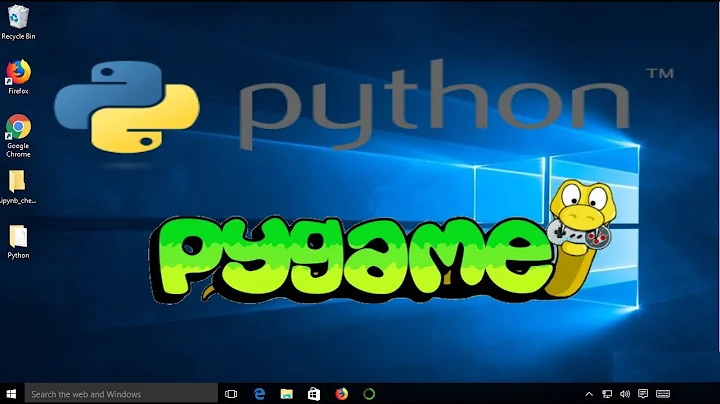Installed Pygame, but Python claims it does not exist
The default python 2.7 on 14.04 is 2.7.6:
Python 2.7.6 (default, Mar 22 2014, 22:59:56)
[GCC 4.8.2] on linux2
So I think that you installed your own python version which does not see the modules installed by apt-get.
Try instead to call python this way (the version installed in /usr/bin):
$ /usr/bin/python
Python 2.7.6 (default, Mar 22 2014, 22:59:56)
[GCC 4.8.2] on linux2
Type "help", "copyright", "credits" or "license" for more information.
>>> import pygame
>>>
Related videos on Youtube
PaulMag
Updated on September 18, 2022Comments
-
PaulMag over 1 year
I want to use pygame, but I am having trouble installing/using it. It appears to be installed, but Python cannot find it. I know there are several similar questions about this, but none of them gave an answer that worked for me.
I used
sudo apt-get install python-pygame. The installation appeared to complete successfully. When I redo it I am told that I have the newest version, so that should be alright.Still, this happens:
>>> import pygame Traceback (most recent call last): File "<stdin>", line 1, in <module> ImportError: No module named pygame When I look for information I find on AskUbuntu that some people have a similar problem, but the only answer I could find was that they had been using Python 3, and that had caused the problem. I am using Python 2.7 (I tried to import in both python2 and python3, but no luck.
Then I tried compiling myself according to the instructions here: http://www.pygame.org/wiki/CompileUbuntu I got this message:
Package ffmpeg is not available, but is referred to by another package. This may mean that the package is missing, has been obsoleted, or is only available from another source E: Package 'ffmpeg' has no installation candidateSo I removed ffmpeg and did everything else, which seemed to work. Running
sudo python setup.py installdid lots of stuff and did not throw any errors or warnings that I could see. But when it was finished, it is still impossible to import pygame.I also found something about 32 bit vs 64 bit problems. Could that be it? In which case, how can I install the correct pygame version when
sudo apt-getdoesn't know it? These related questions made me think it might be a 32/64-bit-issue (they are about Pygame on other OS than Ubuntu):- https://stackoverflow.com/questions/9088051/unable-to-import-pygame/17160820#comment41664611_17160820
- https://stackoverflow.com/questions/8275808/installing-pygame-for-mac-os-x-10-6-8
- https://gamedev.stackexchange.com/questions/56595/installing-the-right-version-of-pygame
My Python version:
Python 2.7.8 |Anaconda 2.0.1 (64-bit)| (default, Jul 2 2014, 18:08:02) [GCC 4.1.2 20080704 (Red Hat 4.1.2-54)] on linux2OS: Ubuntu 14.04LTS, 64-bit
UPDATE:
Pygame works when I use
/usr/bin/pythonand thus run this version of Python instead:Python 2.7. (default, Mar 22 2014, 22:59:56) [GCC 4.8.2] on linux2-
PaulMag over 9 years@MadMike I added this information, and it seems Sylvain Pineau had the correct answer. My Anaconda version of Python seems to be 64-bit. It doesn't say what the 'normal', but I guess it might be 32-bit then. Not sure though.
-
PaulMag over 9 yearsThat's it, running Python like that fixed it! But should not version 2.7.8 be backwards compatible with 2.7.6? Pygame claims to be compatible with versions (2.7 <= x < 2.8). The third digit is only supposed to be backwards compatible patches/bugfixes. It feels very strange to have to use an older version of Python like this.
-
MadMike over 9 yearsI don't think this is a compatibilty issue between python version or 32 vs 64-bit. I rather suspect that the "other" python sets it paths on where to look for packages differently than the ubuntu-python does. You can fire up both python versiosn and do a "import sys; print(sys.path)" and compare the result.




